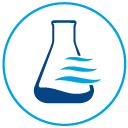
Where Do the Concerning PFAS or “Forever Chemicals” Come From?
What are PFAS?
PFAS stands for perfluoroalkly and polyfluoroalkly substances. PFAS are incredibly long lasting, dangerous and concerning chemicals that have been getting a lot of attention lately from the Environmental Protection Agency (EPA), the Food and Drug Administration (FDA) and multiple environmental advocacy groups (especially those concerned with safe drinking water).
More than 30 states have policies in place to regulate PFAS, most of these regulations are for drinking water sources. Additionally 12 states have either adopted or proposed health guidelines for Maximum Contaminant Levels of PFAS in drinking water sources. California is on both of those lists.
The Harmful Effects of Toxic PFAS Chemicals
PFAS are often referred to as “forever chemicals” because the bonds in their compounds are so strong that they can take centuries to break down naturally. To add to the problem of their “forever” nature, these toxic PFAS chemicals also move rather easily through soil, water, dust and air.
Because they move so freely and last so long these chemicals also get into human bodies through foods, drinking water, air pollution and they settle in our kidneys and livers. Since they don’t break down, they collect there. Over time, their levels rise and they begin to create all kinds of health problems including: liver damage, endocrine damage, thyroid disease, cancer, high cholesterol, delays in physical development, hormone suppression and decrease in fertility. And they do the same in our house pets, farm animals and in wildlife.
According to a CNN report, “A study from 2007 by the US Centers for Disease Control and Prevention (CDC) estimated that PFAS chemicals could be detected in the blood of 98% of the U.S. population.”
Where Do PFAS Come From?
PFAS are human made compounds that have been developed for a wide array of products and uses. The most common sources of PFAS contamination are the following:
- PFAS in food packaged in containing materials, processed with equipment that used PFAS, or grown in PFAS-contaminated soil or water.
- Commercial household products, including stain-resistant and water-repellent fabrics, nonstick products (e.g., Teflon), polishes, waxes, paints, cleaning products, and fire-fighting foams (a major source of groundwater PFAS contamination at airports and military bases where firefighting training occurs).
- Workplaces, including production facilities or industries (e.g., chrome plating, electronics manufacturing or oil recovery) that use PFAS.
- PFAS in drinking water, typically localized and associated with a specific facility (e.g., manufacturer, landfill, wastewater treatment plant, firefighter training facility).
Why PFAS Testing is Crucial
The manufacture of all products using PFAS has been completely halted in the U.S. The EPA released a lifetime health advisory in November 2016 that limited combined exposures to PFOA and PFOS at 70 parts per trillion (ppt). There are two problems with this advisory:
- The advisory is not enforceable.
- Products from other countries still using PFAS in their production allows for them to continue to be added to our homes, stores, landfills and waterways.
Therefore, much more needs to be done.
In the meantime, the need for PFAS testing on products, water sources, soil and even imported goods, is growing. Keeping these PFAS forever chemicals out of food products, consumer goods, drinking water for humans and livestock is vitally important for the future of human and environmental health.
Conclusion
Although pre-packaged water testing test kits are available; they are not the proper method to check for PFAS in drinking water. These packaged tests usually cannot detect in the parts per billion and parts per trillion range. In addition, those kits are mostly useless when it comes to comprehensive water quality testing! Municipality-delivered tap water, bottled water, home-filtered water, and well water all have unique characteristics that pre-packaged kits do not necessarily address or check. Torrent Laboratory understands that all of our client’s situations are unique, which is why we spend time with them up-front to find out exactly what they are interested in determining.
Environmental testing laboratories are experts at conducting these crucial tests for toxic PFAS chemicals in soil, water, air, or on fabrics, products, etc. If you are concerned about PFAS in your water source, in your soil, or in your imported products, contact Torrent Laboratory.






